|
|
|
Sort Order |
|
|
|
Items / Page
|
|
|
|
|
|
|
| Srl | Item |
| 1 |
ID:
191729
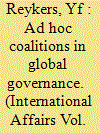

|
|
|
|
|
| Summary/Abstract |
Ad hoc coalitions (AHCs) are an indispensable but scantly conceptualized part of global governance. In recent years, several typologies and classifications of global governance arrangements have been provided, mostly differentiating them based on their organizational design features of degree of formality and membership composition. These do not capture AHCs and the role they play in global governance. In this article, we not only provide a conceptualization of AHCs, but also propose ways in which AHCs fit within the broader global governance architecture. We argue that what sets AHCs apart is not so much their (in)formality or membership, but rather their short-notice creation, their task-specific purpose and their temporarily circumscribed existence. We therefore define AHCs as autonomous arrangements with a task-specific mandate established at short notice for a limited time frame. We then develop a research agenda on the nature and future of AHCs, including their short- and long-term relationship with other multilateral arrangements in the global governance architecture. This is important, as we do yet not know how AHCs complement, compete and impact on international organizations and international crisis response.
|
|
|
|
|
|
|
|
|
|
|
|
|
|
|
|
| 2 |
ID:
191727
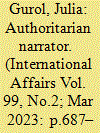

|
|
|
|
|
| Summary/Abstract |
This article argues that transregional communication mechanisms and the diffusion of narratives are important co-drivers towards autocratization. Offering a look beyond the ‘material’ in the study of global authoritarianism, it makes two conceptual arguments. It shows show transregional authoritarian practices are often discursively reinforced. Moreover, it demonstrates how narratives and their transregional diffusion are a form of authoritarian image management and a tool for fostering authoritarian stability. Departing from the basic assumption of authoritarian diffusion, the article is guided by two questions: which narratives of supremacy are used by the Chinese government in the context of the pandemic? And how are these narratives received, reproduced and contested in the Gulf? Based on a qualitative analysis of more than 3,000 media outlets (March–May 2020) from China and the Gulf region, the article shows how China strategically promotes authoritarian narratives regarding its international role, by telling stories of supremacy and heroism and by narratively conjuring a new world order. Moreover, it shows how the Chinese narratives are diffused to Iran, Saudi-Arabia, the United Arab Emirates and Qatar and depicts the different patterns of reception, reproduction and contestation.
|
|
|
|
|
|
|
|
|
|
|
|
|
|
|
|
| 3 |
ID:
191725


|
|
|
|
|
| Summary/Abstract |
The recent Russian invasion of Ukraine has led many commentators to remark that ‘geopolitics is back’. And with geopolitics, the interest in buffer zones is back as well. Yet, International Relations scholarship on buffer zones is confusing and outdated. Scholars disagree on the definition of buffer zones and whether such zones are a vestige of the great power politics of the past or a continuous phenomenon. In this article, we take three steps to reconceptualize buffer zones and their role in international relations. First, we clarify the conceptual confusion by advancing a new definition differentiating between nominal and active buffer zones. Second, we make the case that buffer states and internal buffer zones (i.e., geographic borderlands located within states in rivalry, adjacent to the international borders between the two rivals) share much in common and therefore should be analysed in tandem. Third, we offer a typology of buffer zones with short case-studies based on the dyadic relations of rival states vis-à-vis buffer zones between them. Our goal is to provide a new analytical framework that can serve as a base for a robust research agenda on the role of buffer zones in regional and international stability and security.
|
|
|
|
|
|
|
|
|
|
|
|
|
|
|
|
| 4 |
ID:
191730
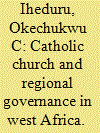

|
|
|
|
|
| Summary/Abstract |
‘Catholic regionalism’ in west Africa exemplifies the capacity of theological claims and theologically informed actors to influence regional governance and international affairs. It is driven by four mutually reinforcing factors: interfaith competition for policy influence and followership, shrinking domestic political space for civil society organizations (CSOs), and de-secularization/counter-secularization pressures (all of which have substantially diminished the church's erstwhile influence); as well as Economic Community of West African States (ECOWAS) reforms granting ‘access’ to CSOs in regional policy. Through a strategy of ‘fateful compromise’ with regional states, the church has, more than its counterparts, developed substantial capacity to influence how regional integration organizations frame and implement policy in Africa. The empirical evidence is derived from fieldwork interviews on the activities of church leaders, namely the bishops represented by the Regional Catholic Episcopal Conference of West Africa (RECOWA); the Catholic bishops’ conferences in Ghana and Nigeria, where interfaith hegemonic competition is most intense; and ECOWAS Commission bureaucrats. The article enriches the ‘new regionalism’ framework with a template to better understand the regional governance activities of Africa's faith-based actors; and contributes to the literature by introducing the concept of ‘fateful compromise’ suggesting multiple trajectories in church-state relations, contrary to the presumption of inevitable ‘elite cooptation’ of social forces as the only option for inclusive or collaborative governance in societies experiencing regression in democracy.
|
|
|
|
|
|
|
|
|
|
|
|
|
|
|
|
| 5 |
ID:
191719
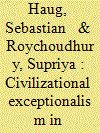

|
|
|
|
|
| Summary/Abstract |
Claims to civilizational exceptionalism have long been part of how states manoeuvre international affairs. While scholarly attention has started to move beyond the civilizational claims of western powers by engaging with those of states beyond the West, few accounts provide in-depth examinations of specific cases or bring these into dialogue with one another. This article offers a comparative analysis of how and why India and Turkey are positioning themselves as civilizational forces in global forums and international cooperation initiatives. Under the Narendra Modi regime, civilizational framings in India have found expression in the seemingly benign discourse of Hindu internationalism. In Turkey, successive governments under Recep Tayyip Erdoğan have linked their engagement abroad to the legacies of the Ottoman Empire. While there are clear differences in their respective civilizational antecedents, both countries draw on a combination of moral superiority and responsibility—India as vishwaguru (the world's guru) and Turkey as dünyanın vicdanı (the world's conscience)—as the legitimizing base for their assumed (normative) exceptionalism on the international stage. Overall, we argue that Indian and Turkish claims to civilizational exceptionalism serve two distinct but interrelated political projects: attempts to overcome centuries-long international marginalization, and efforts to buttress competitive authoritarianism domestically.
|
|
|
|
|
|
|
|
|
|
|
|
|
|
|
|
| 6 |
ID:
191733
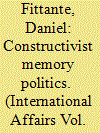

|
|
|
|
|
| Summary/Abstract |
Scholars have done a great deal to unpack the motivations sitting behind nationalists’ appropriation of Holocaust-related memory laws in several eastern European and Baltic states. While these accounts have shed important light on memory politics, there remains much scope for further study. For example, several Eastern European and Baltic states have passed resolutions recognizing the Armenian genocide, as well. Furthermore, the existing literature does not provide any analytical tools to conceptualize the dynamic and complex processes giving rise to memory laws. This article broadens the memory laws scholarship through an original analysis of Latvia's Armenian genocide recognition resolution of 2021. The findings highlight how diverse actors support and pass memory laws through a process of constructivist memory politics. Constructivist memory politics involves the strategies political actors employ to change the salience or meaning of historical events in the creation and promotion of memory laws. Although the analysis focuses on a single case, it provides the analytical tools to reorient how scholars approach memory laws both in Europe and elsewhere.
|
|
|
|
|
|
|
|
|
|
|
|
|
|
|
|
| 7 |
ID:
191728


|
|
|
|
|
| Summary/Abstract |
Former US President Donald J. Trump was infamous for his nakedly transactional approach to politics. However, as we demonstrate in this article through the lens of migration politics, this kind of unabashedly transactional approach is less an outlier than a common feature of contemporary international politics. Drawing in part upon initial findings from our ongoing Diplomacy of Forced Migration Dataset Project, we explore historical and contemporary cases to illustrate how transactional migration management ‘deals’ such as the 2022 UK–Rwanda Migration and Economic Development Partnership are not particularly new, unusual, or revolutionary. In this exploration of the long history of deal-making in the realm of forced migration management, we first define the phenomenon—which we term transactional forced migration (TFM)—and situate it within the growing literature on migration diplomacy, externalization and what is known as the instrumentalization and/or weaponization of migration. We then highlight illustrative historical precedents that presage what we are witnessing today. We additionally identify and unpack several of the under-appreciated connections between TFM schemes and other dimensions of diplomacy and international politics. We conclude with a summary of our argument, its implications for contemporary policy and a few thoughts about what current trends suggest the future is likely to hold.
|
|
|
|
|
|
|
|
|
|
|
|
|
|
|
|
| 8 |
ID:
191720


|
|
|
|
|
| Summary/Abstract |
Policy hybrids, which combine marketizing and liberalizing reforms with social welfare programmes and state support to boost domestic production, are fast becoming the norm globally. How are neo-liberal and national-developmentalist agendas reconciled as governing practices, and what are their national and international outcomes and implications? This article focuses on the understudied case of India, arguing that a paternalist political rationality, which melds paternalist logics in neo-liberalism and the government's Hindutva civilizationalist politics, underpins its flagship economic policy, the Atmanirbhar Bharat Abhiyan (Self-reliant India Mission). This policy, through production-linked incentives, aims to boost Indian manufacturing. India has benefited from a global push to diversify supply chains and forge new geopolitical partnerships, such as the Quad, to undermine China's manufacturing dominance and geopolitical assertiveness. Yet, its current approach consolidates the dominance of large firms, producing an elitist political economy, and does not address structural weaknesses through public investment in areas like research and education. This has implications for India's development, global trade and geopolitics. These arguments are made by identifying the paternalist logics in the theories and practices of neo-liberalism, and in Hindutva civilizationalist politics; assessing the aims of the Atmanirbhar Bharat Abhiyan as elaborated by government officials; and evaluating the early outcomes of production-linked incentive schemes.
|
|
|
|
|
|
|
|
|
|
|
|
|
|
|
|
| 9 |
ID:
191731
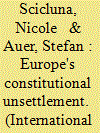

|
|
|
|
|
| Summary/Abstract |
Law is central to what the European Union is and how it works, but the mismatch between the legal and political dimensions of European integration is undermining the EU from within and limiting its ability to project its power beyond its borders. This article aims to explicate the clash between Europe as a community of law, on the one hand, and Europe as a political project, on the other, by focusing on two crises. The first is the crisis that has arisen in relation to Poland's backsliding when it comes to democracy and the rule of law. The second crisis is the Russian invasion of Ukraine. The two crises are interlinked. An effective response to Russian aggression requires of the EU the kind of solidarity, confidence and unity of purpose that has been undercut by Poland's rule-of-law crisis and by the inadequacy of European responses to it. Thus, both crises unsettle the EU's constitutional settlement, revealing the political limits of legal integration. We find that, if Europe's leaders are to better align the EU's legal order with its political goals and capacity to act, then they will need to acknowledge, and work within, the constraints the EU faces as a union of nation states.
|
|
|
|
|
|
|
|
|
|
|
|
|
|
|
|
| 10 |
ID:
191718


|
|
|
|
|
| Summary/Abstract |
This article considers civilizational politics at the interface between nationalism and internationalism. It does this by focusing on some key trends in India's engagements with UNESCO and its flagship conventions for culture. The article builds on existing scholarship regarding the political appropriation of key religious and heritage sites within India by critically examining how Hinduism is presented to UNESCO and other organizations as a religious and civilizational heritage for global recognition and endorsement. We argue that UNESCO's programmes and conventions are being co-opted via a rewriting of history and in the creation of heritage imaginaries of a Hindu nation. From there, the discussion extends previous critiques regarding the conjoining of Hinduism to a Harappan civilization heritage by showing how this geographically extends outwards via a programme of Indian Ocean diplomacy conceived around environmental and historical connectivities. In pulling these various threads together, the article demonstrates the ways in which Hindu civilizational discourses circulate at the international level in seemingly benign and banal ways, and, yet, simultaneously advance the domestic cultural politics now familiar to the Hindutva movement.
|
|
|
|
|
|
|
|
|
|
|
|
|
|
|
|
| 11 |
ID:
191732


|
|
|
|
|
| Summary/Abstract |
Drawing on history and International Relations, this article considers how states might respond to genocide in a more realist, post-liberal international order (LIO). It argues that even within an emergent realist international order (RIO) that downgrades normative commitments to fundamental human rights, unchecked genocide will continue to pose a threat to international peace and security and states will be interested in halting it. Within an emergent RIO, many of the non-coercive tools for halting genocide made available by liberal order will be constrained. Yet, scholars have in any case found that where genocidal-type violence has already begun, non-coercive tools are rarely effective (Bellamy and McLoughlin, 2022; Broache and Cronin-Furman, 2021). This article suggests that within an RIO which encourages greater amounts of self-help, regional and local actors will have realpolitik motivations for undertaking military interventions which halt genocides occurring in their neighbourhood. While such dynamics are observable during earlier period of international history, an emergent RIO will also benefit from the persistence of fundamental norms such as the prohibition on genocide. Given these factors, and while it will be highly non-ideal, an emerging RIO might retain the possibility of effectively responding to some genocides.
|
|
|
|
|
|
|
|
|
|
|
|
|
|
|
|
| 12 |
ID:
191717


|
|
|
|
|
| Summary/Abstract |
Scholarly debates on ‘civilization states’ now include India as a potential exemplar, in light of the Bharatiya Janata Party's (BJP) insistence on a greater Hindu culture and tradition rooted in ancient India. Most of these debates are located in politico-cultural contexts, whereas this article does something different. It examines an economic organization, the World Hindu Economic Forum (WHEF), which centres its business strategy and identity around the rhetoric of civilization. WHEF is a distinctive and understudied transnational elite platform that has organic connections with the BJP and Hindu nationalist circles around the world. Drawing on WHEF documentation and interviews with WHEF members, and employing a Gramscian approach, this article sheds light on three social aspects of utilizing the civilizational rhetoric in WHEF's business strategy: a justification of development rooted in the past, a claim of superiority over the West, and a promise of development for the future. It argues that all three aspects make up a particular elite conception of the world shaped around the WHEF members' ideological and material interests. Based on this elite agency, this article argues that the rhetoric of civilization is a product of today's existing global political economy and ultimately serves to reinforce Hindu nationalist sentiments along with neo-liberal market-oriented ideas.
|
|
|
|
|
|
|
|
|
|
|
|
|
|
|
|
| 13 |
ID:
191716


|
|
|
|
|
| Summary/Abstract |
India has used civilizational discourses as part of its foreign policy to articulate its rise and rightful place in the world order. This article primarily examines India's civilizational arguments in south Asia. India's civilizational arguments in the region demand scrutiny as the neighbourhood is a theatre of contestation between territorial India and the claims of its civilizational space. Analysing historical accounts on Indian civilization, official documents and domestic narratives in India about south Asia, the article makes three points. First, India's civilizational articulation oscillates between two paradigmatic and contrasting representations of Nehruvianism and Hindutva variants. Second, it is argued that despite the ascendancy of Hindutva's civilizational symbolism since 2014, India's south Asia policy shows no paradigmatic change. Finally, it points to how the Hindutva project may be detrimental to India's self-image and dealings in south Asia. The article argues that while there is no official corroboration of Hindutva's claims in India's south Asia policy, the increasing salience of the domestic discussions around Akhand Bharat (undivided India) invites complications for India in its neighbourhood. India's Hindutva-driven civilizational claims raise anxieties of an Indian cultural hegemony in an asymmetric region splintered across territorial and nationalistic lines.
|
|
|
|
|
|
|
|
|
|
|
|
|
|
|
|
| 14 |
ID:
191713


|
|
|
|
|
| Summary/Abstract |
The (re)turn in interest around the concept and projections of civilizational states has followed the recent surge of different authoritarian-populist versions of this discourse, notably in China, India, Russia, Turkey and the United States. In the case of India, the election of Prime Minister Narendra Modi in 2014 supercharged the ideology of Hindutva (the ‘Hinduness’ of the nation) within government, carefully stoked by decades of ground-level social programming and activism by the Rashtriya Swayamsevak Sangh (RSS) and other parts of the Sangh Parivar (the Hindutva family of organizations). Compared to the 1990s and early 2000s, when the Bharatiya Janata Party (BJP) first came to national power espousing the ideas of Hindutva, India is now wealthier (albeit highly unevenly, and with considerable economic weaknesses and fault-lines); and its nationalistic undermining of democratic, liberal norms is deeper, but also more widely mirrored among some western and other southern states. The forces of Hindutva show no signs of abating, and oppositional voices—from secularists, young people, academics, think tanks and human rights organizations, among others—are being openly suppressed. What to external observers may seem a largely benign, even banal, international projection of yoga, traditional medicine and classical dance, and perhaps rather arcane debates over the origins and travels of Aryan peoples, religions and languages, are understood on all sides domestically as existential battles over what constitutes India and being Indian.
|
|
|
|
|
|
|
|
|
|
|
|
|
|
|
|
| 15 |
ID:
191721


|
|
|
|
|
| Summary/Abstract |
The consequences of the Iraq War of 2003 continue to reverberate throughout the Middle East and wider world in multiple, if still underacknowledged, ways. Though subsequent regional developments have taken centre stage—notably those surrounding the Arab Uprisings and the subsequent civil wars and interventions in Libya, Syria and Yemen—the effects of the Iraq War remain powerfully present. A watershed event, it has generated major and irreversible changes at the international and regional level. It has empowered certain states and actors, and weakened others— notably Iraq itself—but its impact on both the regional and wider global security landscape cannot be underestimated. Arguing that the events surrounding the Iraq War and its outcome constituted a ‘critical juncture’, or major inflexion point in regional order, this article examines three interdependent features of the changing regional architecture. The first relates to the region's international alignments; the second to its balance of power; and the third to the changing institutional environment, which challenges and redefines the very boundaries of the Middle East.
|
|
|
|
|
|
|
|
|
|
|
|
|
|
|
|
| 16 |
ID:
191726


|
|
|
|
|
| Summary/Abstract |
Defence has a carbon problem. The strengthening of net-zero emissions targets in response to the deepening climate crisis is forcing militaries to find answers to the question of how to wield force effectively within the constraints of a net-zero world. This article introduces the concept of ‘low-carbon warfare’ as a means of capturing recent developments, the extent to which they dovetail with existing concerns regarding the business of war in the twenty-first century, and the prospect of significant changes to how militaries operate in the years ahead as the global energy transition unfolds. The article demonstrates that the pursuit of low-carbon warfare will not be easy owing to the practical challenges of transitioning militaries away from fossil fuels. Moreover, low-carbon warfare will not mitigate all the ethical and environmental concerns associated with military deployments up to and including war. It does nevertheless offer a valuable starting point for conceptualizing how militaries are beginning to address their ‘carbon bootprints’ and what this will mean for future operations.
|
|
|
|
|
|
|
|
|
|
|
|
|
|
|
|
| 17 |
ID:
191715
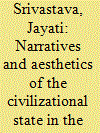

|
|
|
|
|
| Summary/Abstract |
The term ‘civilizational state’ is used by emerging powers, including India, to mark themselves as distinct from the Westphalian states. This article addresses the following questions: why does India invoke this term despite its association with illiberal states? What ideological foundations and resources inform this narrative? And how does the ‘new’ India envision its role in international politics? Using an interpretive analysis of select texts and imagery, the article delineates the intellectual roots and aesthetic resources deployed by ‘new’ India to bring forth a civilizational state narrative which has become an important tool of power projection at both domestic and international levels. It argues that the recent shift from ‘civilization’ to ‘civilizational state’ draws its intellectual roots from early Hindutva idealogues. It is based on a conflict-ridden/homogenous understanding of civilization, making it ambivalent towards an inclusive/plural civilizational narrative articulated and nurtured by the nationalists. Internationally, the civilizational state narrative is geared towards reinforcing ‘new’ India's claim to be in the league of great powers; projecting itself as a power with a difference. Being the world's largest democracy helps in reinforcing this narrative, but signs of a shift towards a homogenous civilizational narrative will have wider implications for India's role in international politics.
|
|
|
|
|
|
|
|
|
|
|
|
|
|
|
|
| 18 |
ID:
191722
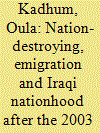

|
|
|
|
|
| Summary/Abstract |
While emigration and population displacements have long been a feature of Iraqi history, this article argues that the 2003 Anglo-American intervention in Iraq and its legacy has contributed to the gradual disappearance of many non-Muslim Iraqi minorities from Iraq. Though the legacy of 2003 can be attributed to a confluence of domestic and geopolitical factors, it is argued here that the 2003 intervention set in motion a process of nation-destroying instead of nation-building, as Iraqi nationhood was divided along primordial lines. Caught between competing ethnic and sectarian nationalisms, Iraqi non-Muslim minorities became targets in the quest for territorial gain and political power heralding an unprecedented and steady level of emigration. This has changed the ethnic and religious demographic of Iraq, the identity of the Iraqi nation-state, as well as fragmented Iraq's multiple ethnic and religious nations both inside and outside the country. Indeed, the effects of nation-destroying have also been transported to the diaspora, strengthening communal identities, altering attachments and creating distance between Iraqi communities abroad. This has led to distanced transnational ethnic and religious Iraqi nations in diaspora who must now also contend with assimilation, a loss of culture and language in the absence of physical links to Iraq. The article offers the first comprehensive and scholarly treatment of the effects of emigration of Iraq's non-Muslim minorities on Iraqi nationhood within the new Iraqi nation-state. It therefore contributes conceptually and empirically to advancing our understanding of the role of nation-destroying and emigration in nationalizing processes, a neglected area in current migration and nationalism scholarship.
|
|
|
|
|
|
|
|
|
|
|
|
|
|
|
|
| 19 |
ID:
191723


|
|
|
|
|
| Summary/Abstract |
Because of his personality, had Donald Trump won the 2020 election the remarkable and unexpected united response by NATO allies to the February 2022 Russian invasion of Ukraine would not have happened. Relying on leader personality research in foreign policy, we demonstrate this by using the counterfactual method of analysis. Specifying key differences between Biden's and Trump's personalities in terms of their experiences, traits and beliefs, we explicitly show that president Trump would have been very unlikely to share US intelligence, rally NATO allies in support of Ukraine or challenge Vladimir Putin. In contrast, these responses fit very well with Joe Biden's personality. We first present counterfactual analysis as a method before comparing Biden and Trump along personality characteristics known to significantly influence foreign-policy decisions. Through our case-study, we demonstrate the value of using systematic and theoretically grounded counterfactual methods for assessing the importance of individual differences between leaders and emphasizing their impact on international affairs.
|
|
|
|
|
|
|
|
|
|
|
|
|
|
|
|
| 20 |
ID:
191714


|
|
|
|
|
| Summary/Abstract |
Ambitions for India to enact the role of vishwaguru or ‘world teacher’ are a conspicuous feature of foreign policy discourse under contemporary Hindu nationalist rule in India. This discourse, and India's foreign-policy practice, engage the international realm with a puzzling intensity given Hindu nationalism's inward-looking and exclusionary emphasis on majoritarian cultural unity. In this article, I leverage International Relations scholarship on social closure, international order and recognition struggles to examine the historical lineages and recent articulations of nineteenth-century religious reformist ideas about India's world mission and spiritual superiority. I argue that different Indian civilizational imaginaries across time produce a pedagogical imperative, aimed at the transformation of global social hierarchies. Centred on a quest to assert social superiority and remake the terms of recognition, any given vishwaguru project nonetheless relies on international recognition. The recent domestic and diasporic appeal of Hindu nationalist foreign policy stems from how it appears to intervene to rectify the longstanding misrecognition of India. In this context, western liberal states' instrumental recognition of India as a democratic partner and defender of liberal order in the face of a ‘China challenge’ works to endorse and bolster the vishwaguru project of India's current domestic political moment.
|
|
|
|
|
|
|
|
|
|
|
|
|
|
|
|
|
|
|
|
|